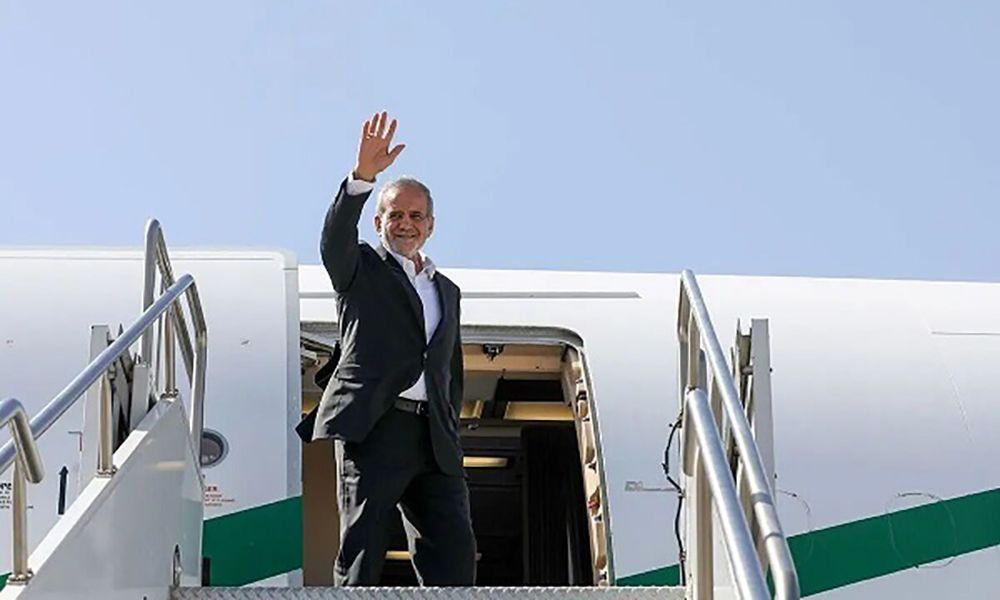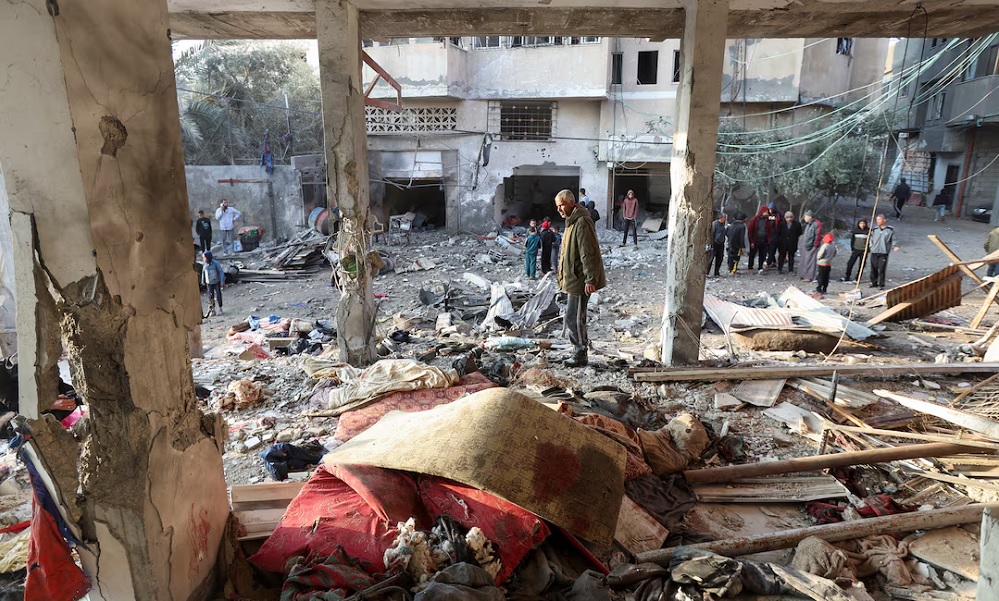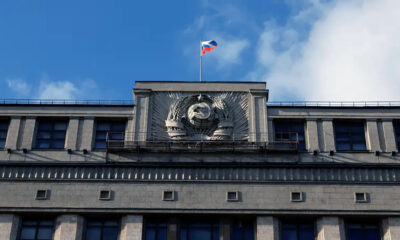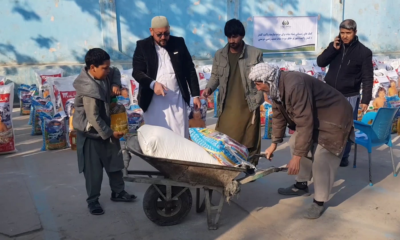Regional
Iran’s president to make rare visit to Egypt for D-8 summit
Iran will discuss regional and bilateral affairs with the participating countries on the sidelines of the summit, Baghaei added.

Iranian President Masoud Pezeshkian will take part in a summit of big Muslim countries in Egypt on Thursday, Foreign Ministry spokesperson Esmaeil Baghaei said, the first visit by an Iranian president to Egypt in more than a decade, Reuters reported.
Egypt is hosting the summit of the D-8 Organization for Economic Cooperation, which also includes Bangladesh, Indonesia, Malaysia, Nigeria, Pakistan and Turkey.
Relations between Egypt and Iran have generally been fraught in recent decades but the two countries have stepped up high-level diplomatic contacts since the eruption of the Gaza crisis last year as Egypt tried to play a mediating role, read the report.
Iran's Foreign Minister Abbas Araqchi travelled to Egypt in October to discuss regional issues with Egyptian officials, while his Egyptian counterpart Badr Abdelatty travelled to Tehran earlier in July to attend Pezeshkian's inauguration.
"We have the important summit... known as D-8 in Egypt, the foreign minister will take part in the ministerial conference and then the summit will be held with the participation of the president," Baghaei said in a weekly televised news conference.
Iran will discuss regional and bilateral affairs with the participating countries on the sidelines of the summit, Baghaei added.
The D-8 was established in 1997 to improve cooperation between countries stretching from Southeast Asia to Africa.
Regional
Bomb kills chief of Russian nuclear protection forces in Moscow

A bomb hidden in an electric scooter killed a senior Russian general in charge of nuclear protection forces in Moscow on Tuesday, Russia’s investigative committee said.
Lieutenant General Igor Kirillov, who is chief of Russia’s Nuclear, Biological and Chemical Protection Troops, was killed outside an apartment building on Ryazansky Prospekt, which starts a road some seven km (4 miles) southeast of the Kremlin, Reuters reported.
“Igor Kirillov, the head of the radiation, chemical and biological protection forces of the armed forces of the Russian Federation, and his assistant were killed,” the investigative committee said.
Photographs posted on Russian Telegram channels showed a shattered entrance to a building littered with rubble and two bodies lying in the blood-stained snow.
Reuters footage from the scene showed a police cordon. A criminal case has been opened.
Russia’s radioactive, chemical and biological defense troops, known as RKhBZ, are special forces who operate under conditions of radioactive, chemical and biological contamination.
On Monday, Ukrainian prosecutors charged Kirillov in absentia with the alleged use of banned chemical weapons in Ukraine, the Security Service of Ukraine said, according to the Kyiv Independent.
Russia denies those accusations.
Britain in October sanctioned Kirillov and the nuclear protection forces for using riot control agents and multiple reports of the use of the toxic choking agent chloropicrin on the battlefield.
Regional
Hezbollah chief says group lost its supply route through Syria

Hezbollah head Naim Qassem said on Saturday that the Lebanese armed group had lost its supply route through Syria, in his first comments since the toppling of President Bashar al-Assad nearly a week ago by a sweeping rebel offensive.
Under Assad, Iran-backed Hezbollah used Syria to bring in weapons and other military equipment from Iran, through Iraq and Syria and into Lebanon. But on Dec. 6, anti-Assad fighters seized the border with Iraq and cut off that route, and two days later, rebels captured the capital Damascus.
"Yes, Hezbollah has lost the military supply route through Syria at this stage, but this loss is a detail in the resistance's work," Qassem said in a televised speech on Saturday, without mentioning Assad by name, Reuters reported.
"A new regime could come and this route could return to normal, and we could look for other ways," he added.
Hezbollah started intervening in Syria in 2013 to help Assad fight rebels seeking to topple him at that time. Last week, as rebels approached Damascus, the group sent supervising officers to oversee a withdrawal of its fighters there.
More than 50 years of Assad family rule has now been replaced with a transitional caretaker government put in place by Hayat Tahrir al-Sham, a former al Qaeda affiliate that spearheaded the rebel offensive.
Qassem said Hezbollah "cannot judge these new forces until they stabilise" and "take clear positions", but said he hoped that the Lebanese and Syrian peoples and governments could continue to cooperate.
"We also hope that this new ruling party will consider Israel an enemy and not normalise relations with it. These are the headlines that will affect the nature of the relationship between us and Syria," Qassem said.
Hezbollah and Israel exchanged fire across Lebanon's southern border for nearly a year in hostilities triggered by the Gaza war, before Israel went on the offensive in September, killing most of Hezbollah's top leadership.
Regional
Israel kills at least 66 Palestinians in Gaza, strikes post office used as shelter

An Israeli strike killed at least 30 Palestinians and wounded 50 others who were sheltering in a post office in central Gaza Strip, bringing the death toll on Thursday in the enclave to 66.
With no sign of let-up in the 14-month-old conflict, the strike hit a postal facility in Nuseirat camp where displaced families had sought refuge and also damaged several nearby houses, medics told Reuters.
The Israeli military did not immediately respond to a request for comment.
Nuseirat is one of the Gaza Strip’s eight historic camps originally for Palestinian refugees from the 1948 war around the establishment of Israel. Today, it is part of a dense urban area crowded with displaced people from throughout the enclave.
Earlier on Thursday, two Israeli strikes in southern Gaza killed 13 Palestinians who Gaza medics and Hamas said were part of a force protecting humanitarian aid trucks. Israel's military said they were Hamas militants trying to hijack the shipment.
Many of those killed in the attacks on Rafah and Khan Younis had links to Hamas, according to sources close to the group.
The Israeli military said in a statement the two airstrikes aimed to ensure the safe delivery of humanitarian aid and accused Hamas members of planning to prevent the aid from reaching Gaza civilians who need it.
The statement said the Hamas members aimed to hijack the aid "in support of continuing terrorist activity".
Armed gangs have repeatedly hijacked aid trucks, and Hamas has formed a task force to confront them. The Hamas-led forces have killed over two dozen members of the gangs in recent months, Hamas sources and medics said.
Hamas said Israeli military strikes have killed at least 700 police tasked with securing aid trucks in Gaza since the war began on Oct. 7, 2023. It has accused Israel of trying to protect looting and "creating anarchy and chaos to prevent aid from reaching the people of Gaza".
Separately, the Israeli military on Thursday ordered residents of several districts in the heart of Gaza City to evacuate, saying it would respond to rockets launched from those areas.
"This is a pre-warning before an attack," read a military statement posted on X that some residents also received as text and audio alerts on their mobile phones.
The evacuation orders caused a new wave of displacement. At nightfall, dozens of families streamed out of the areas heading toward the centre of the city.
ISRAELI STRIKES IN GAZA CITY, CENTRAL GAZA
Israeli bombings of a residential building in Gaza City's al-Jalaa Street and a house west of Nuseirat killed 22 people, medics and the Palestinian news agency WAFA said.
In the northern Gaza refugee camp of Jabalia, where the army has operated since October, health officials said an orthopaedic doctor, Saeed Judeh, was shot dead by Israeli forces while on his way to Al-Awda Hospital where he usually treated patients.
The health ministry said his death raised to 1,057 the number of healthcare workers killed since the war began.
Months of ceasefire efforts by Arab mediators, Egypt and Qatar, backed by the United States, have failed to conclude a deal between the two warring sides.
On Wednesday, the United Nations General Assembly overwhelmingly voted to demand an immediate, unconditional and permanent ceasefire and the immediate release of all hostages seized in Israel in October 2023 and held by Hamas in Gaza.
The war in the Palestinian enclave began after Hamas gunmen stormed into Israeli communities, killing around 1,200 people and taking about 250 hostages back to Hamas-run Gaza, according to Israeli tallies.
Since then, Israel's military has levelled swathes of Gaza, driving nearly all of its 2.3 million people from their homes, giving rise to deadly hunger and disease and killing more than 44,800 people, according to Palestinian health authorities.
-

 Latest News4 days ago
Latest News4 days agoAfghanistan seals T20I series victory over Zimbabwe
-

 World4 days ago
World4 days agoSyrian clerics in former Assad stronghold call for national unity, democracy
-

 Latest News4 days ago
Latest News4 days agoU.S. sentences Afghan man to 30 years in prison for narco-terrorism and witness tampering
-

 Latest News5 days ago
Latest News5 days agoDAB has collected over 7 billion Afghanis in worn-out banknotes over past year
-

 International Sports3 days ago
International Sports3 days agoMessi vs Ronaldo: A look at their market values over the years
-

 Latest News4 days ago
Latest News4 days agoChinese, Tajik officials discuss Afghanistan
-

 Latest News4 days ago
Latest News4 days agoInvestment in Afghanistan’s pharmaceutical sector reaches $300 million: Union
-

 Sport4 days ago
Sport4 days agoAfghanistan’s Gulbaddin Naib fined 15% of match fee for dissent

























